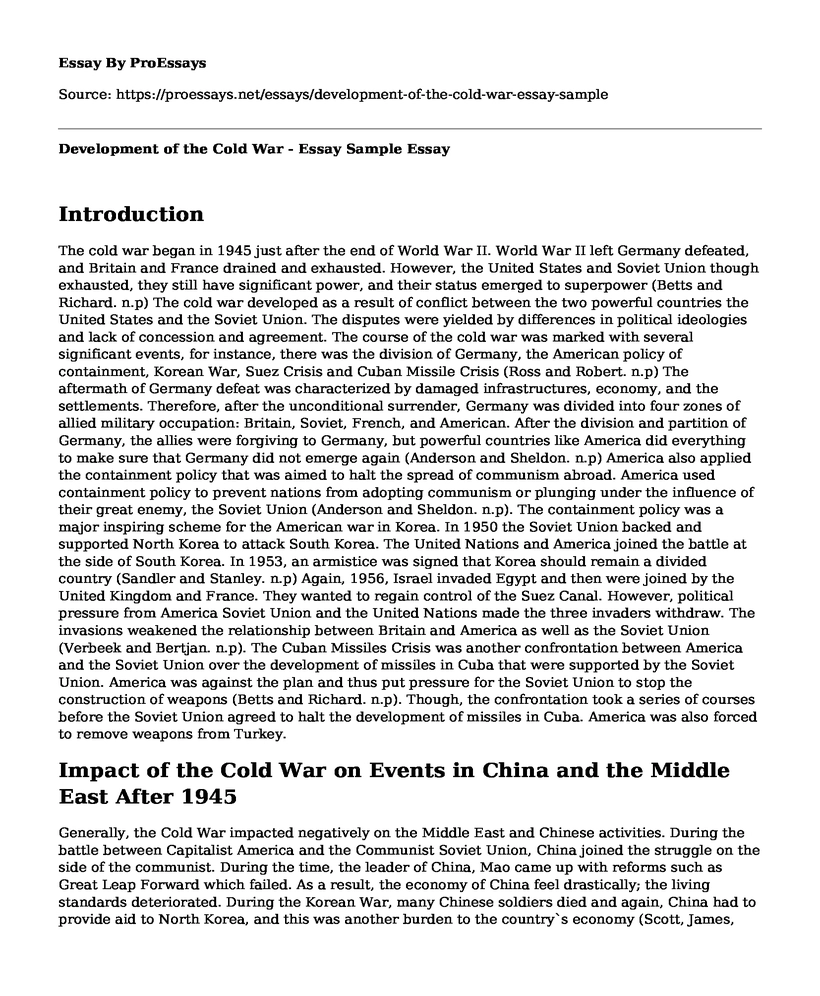Introduction
The cold war began in 1945 just after the end of World War II. World War II left Germany defeated, and Britain and France drained and exhausted. However, the United States and Soviet Union though exhausted, they still have significant power, and their status emerged to superpower (Betts and Richard. n.p) The cold war developed as a result of conflict between the two powerful countries the United States and the Soviet Union. The disputes were yielded by differences in political ideologies and lack of concession and agreement. The course of the cold war was marked with several significant events, for instance, there was the division of Germany, the American policy of containment, Korean War, Suez Crisis and Cuban Missile Crisis (Ross and Robert. n.p) The aftermath of Germany defeat was characterized by damaged infrastructures, economy, and the settlements. Therefore, after the unconditional surrender, Germany was divided into four zones of allied military occupation: Britain, Soviet, French, and American. After the division and partition of Germany, the allies were forgiving to Germany, but powerful countries like America did everything to make sure that Germany did not emerge again (Anderson and Sheldon. n.p) America also applied the containment policy that was aimed to halt the spread of communism abroad. America used containment policy to prevent nations from adopting communism or plunging under the influence of their great enemy, the Soviet Union (Anderson and Sheldon. n.p). The containment policy was a major inspiring scheme for the American war in Korea. In 1950 the Soviet Union backed and supported North Korea to attack South Korea. The United Nations and America joined the battle at the side of South Korea. In 1953, an armistice was signed that Korea should remain a divided country (Sandler and Stanley. n.p) Again, 1956, Israel invaded Egypt and then were joined by the United Kingdom and France. They wanted to regain control of the Suez Canal. However, political pressure from America Soviet Union and the United Nations made the three invaders withdraw. The invasions weakened the relationship between Britain and America as well as the Soviet Union (Verbeek and Bertjan. n.p). The Cuban Missiles Crisis was another confrontation between America and the Soviet Union over the development of missiles in Cuba that were supported by the Soviet Union. America was against the plan and thus put pressure for the Soviet Union to stop the construction of weapons (Betts and Richard. n.p). Though, the confrontation took a series of courses before the Soviet Union agreed to halt the development of missiles in Cuba. America was also forced to remove weapons from Turkey.
Impact of the Cold War on Events in China and the Middle East After 1945
Generally, the Cold War impacted negatively on the Middle East and Chinese activities. During the battle between Capitalist America and the Communist Soviet Union, China joined the struggle on the side of the communist. During the time, the leader of China, Mao came up with reforms such as Great Leap Forward which failed. As a result, the economy of China feel drastically; the living standards deteriorated. During the Korean War, many Chinese soldiers died and again, China had to provide aid to North Korea, and this was another burden to the country`s economy (Scott, James, and Ralph. 748) War lead to famine in China that lead to many deaths. You see, during the war, the peasant was not able to produce enough agricultural products for the whole country.
On the other side, the Cold War dominated many regions including the Middle East. The Middle East was an area of contention during the Cold War. The Superpower countries were aware that the Middle East has a strategic position, gas deposits, and oilfields. Every superpower thus wanted to conquer the region and deny access to the enemies. As a result, the Middle East did not benefit from the oil and gas supply. The Cold War thus acted as a distraction, diverting the attention of domestic issues which could have been established and solved earlier (Scott, James and Ralph. 742). Therefore, the impact of cold war on China and the Middle East were impacted by economic disruption, utilization of resources by the superpowers and thus underdevelopment in the regions.
Work Cited
Anderson, Sheldon. A Cold War in the Soviet Bloc: Polish-East German Relations, 1945-1962. Routledge, 2018. Retrieved from https://www.taylorfrancis.com/books/9780429971297
Betts, Richard K., ed. Conflict after the Cold War: arguments on causes of war and peace. Taylor & Francis, 2017. Retrieved from https://books.google.com/books?hl=en&lr=&id=rCUlDwAAQBAJ&oi=fnd&pg=PP1&dq=cold+war&ots=ZWxQX3WECa&sig=XTfMAQyoCuCJbJ0oawLxZbdALik
Ross, Robert S. China, the United States, and the Soviet Union: Tripolarity and Policy Making in the Cold War: Tripolarity and Policy Making in the Cold War. Routledge, 2016. Retrieved from https://content.taylorfrancis.com/books/download?dac=C2014-0-39471-4&isbn=9781315287645&format=googlePreviewPdf
Sandler, Stanley. The Korean War: no victors, no vanquished. University Press of Kentucky, 2015. Retrieved from https://books.google.com/books?hl=en&lr=&id=WLweBgAAQBAJ&oi=fnd&pg=PP1&dq=korean+war&ots=UfRalnx4Rl&sig=sYVAmgZr3wzMMyNwbESNRfDEnZ0
Scott, James M., and Ralph G. Carter. "From Cold War to Arab Spring: mapping the effects of paradigm shifts on the nature and dynamics of US democracy assistance to the Middle East and North Africa." Democratization 22.4 (2015): 738-763. Retrieved from https://www.tandfonline.com/doi/abs/10.1080/13510347.2013.877893
Verbeek, Bertjan. Decision-making in Great Britain During the Suez Crisis: Small groups and a persistent leader. Routledge, 2017. Retrieved from https://www.taylorfrancis.com/books/9781315258416
Cite this page
Development of the Cold War - Essay Sample. (2022, Dec 17). Retrieved from https://proessays.net/essays/development-of-the-cold-war-essay-sample
If you are the original author of this essay and no longer wish to have it published on the ProEssays website, please click below to request its removal:
- History Essay: Ancient Egypt and Mesopotamia. Ancient Minoan and Western Civilization
- List of Facts Pertaining to Egyptian's Life After Death
- Essay on U.S. Enters WWI: Woodrow Wilson's World Safe for Democracy
- Essay Example on Artist Sam Gilliam's Mental Health Fight: A Case Study
- 20th Century American Indian Removals and Urbanization - Research Paper
- Unocal Case: Revolutionizing World & Protecting Human Rights - Essay Sample
- Essay Example on Albert Bandura: A Prolific Social Cognitive Psychologist







